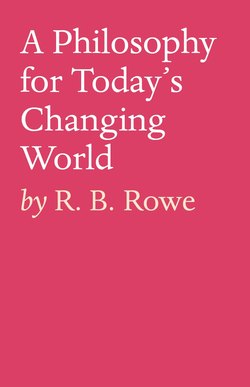Читать книгу A Philosophy for Today’s Changing World - R. B. Rowe - Страница 3
На сайте Литреса книга снята с продажи.
Background The Gift of Life
ОглавлениеWe live and die, in accordance, with a process set in place by God. Now, you may question this and, it is agreed that, despite centuries of research and learned discussion, none of us really know the truth of this statement. It is a reasoned conclusion based on the available facts - we all die, and can only provide educated guesses at what happens from then on.
You will note that any reference to the various existing religious beliefs,has been excluded in the above comment, as these are only of value to those who wish to accept them.
In effect, you are being asked to accept another’s truth, and, while I respect the individual’s right to choose, it is suggested that the multitude of beliefs, mainly thousands of years old, already in existence, is, in itself, an indication of Mankind’s uncertainty and lack of ultimate authority in this area.
Perhaps, then in the absence of more specific facts, you will agree that a “balance of probabilities” approach, is the best basis we can use, to try to sort this out - keeping in mind, that Life is not only a continuing, unfolding reality, to be experienced, it is also a continuing problem of probabilities, yet to be solved. This is the task, in which, we are all involved.
So, to begin – in general terms - Einstein gave us a partial answer that requires the amalgamation of Science and Philosophy – a marriage, apparently, not always favoured by either party, but, as a reconciliation between these two disciplines, is necessary to any discussion concerning our existence, you may agree that this book helps to provide a reasonable basis for the union.
Science acknowledges those matters it can and can’t prove, and is in a continuing state of flux in its efforts to widen its boundaries. This is, as it should be, but many of the concepts which guide our way of life, today, just can’t be established in the same way and are, therefore, a matter of opinion, or an expression of probabilities, until proven one way or the other.
Even then, this proof must continue to stand up to the onslaught of later knowledge, or be discarded as irrelevant. Science is, in fact, a growing body of knowledge, based on research – some of which we are pretty sure is factual, but, all of it is subject to reworking, as new knowledge and ideas emerge.
A brief look at our troubled world today, shows that the leaders of the Judeo-Christian-Islamic religions have failed in their endeavours to satisfy Man’s need to know who and what we are – we need to know about our relation-ships with other species in our World and beyond, and the confusion, caused by this inability, has resulted in our world going through many years of uncertainty.
The junction where Science and Philosophy meet should be one of cautious mediation, in which both parties can agree on mutual points of view, while accepting that there will always be a shifting area of doubt at the fringe, that requires tolerance of the other’s standpoint, and the realisation that we all gain from such an understanding.
So, the question arises – is there an approach that encompasses all of these aspirations, and allows a better understanding of our World and it’s place in the Universe? This book suggests that there is another way and outlines such an approach. A part of this search requires that Man’s relationships with his World and his Creator are explored and, in so doing, a tentative bridge between Science and Philosophy is suggested. This is the “need to know” in action and may also be an acceptable starting point for others.
